Europe
‘Sprinkled with our blood’: Why so many Ukrainians resist land for peace
The Washington Post September 16, 2024
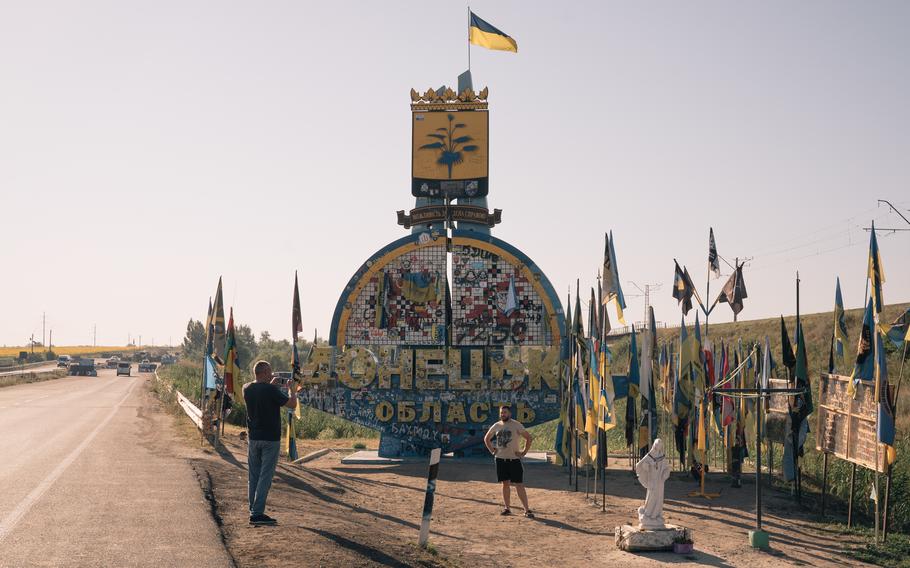
Men stop at a sign marking an entrance to the Donetsk area, part of Ukraine’s Donbas region. (Alice Martins for The Washington Post)
POKROVSK, Ukraine — As Russian forces advance through Ukraine’s eastern Donbas region, the pressure is increasing on Kyiv to sit down at the negotiating table with Moscow and start talking land for peace.
Even as Ukrainian President Volodymyr Zelensky heads to the United States bearing a “victory plan” for President Joe Biden that he says will end the war in Ukraine’s favor, the future of U.S. leadership is on a knife-edge. Republican nominee Donald Trump and his running mate, Sen. JD Vance (Ohio), have made it clear that their plan for the end of the war would involve Ukraine ceding territory.
Any kind of “land for peace” deal would probably seal the fate of Donbas, which has been mired in conflict and separatism stoked by Moscow since the war there began a decade ago. Polling, however, shows that Ukrainians are not ready to give up their land, especially among those soldiers in Donbas who have been fighting for it for the past 10 years.
“There would be a coup d’état, because this idea would be promoted by those who sit in peaceful cities. … No one here would support it — this land is now sprinkled with our blood,” said Veronika, 23, a combat medic who resettled in Slovyansk after she fled Donetsk city with her family as a teenager, when Russian-backed separatists captured it in 2014. As with several others interviewed for this article, The Washington Post is not identifying Veronika by her full name in keeping with military rules.

Veronika, 23, is a combat medic who was born in Donetsk city and now lives in Slovyansk. (Alice Martins for The Washington Post)
An opinion poll by the Kyiv International Institute of Sociology conducted in May found that a third of Ukrainians are now prepared to make territorial concessions to Russia if this would bring a swift end to the war and preserve Ukraine’s independence. But more than half the population still rejects the idea of conceding land for peace.
Earlier polling by the Carnegie Endowment for International Peace found that nearly half of Ukrainians were ready to engage in negotiations with Russia, but the number plummeted if territorial concessions were put on the table. Nearly two-thirds, for instance, rejected a settlement that would freeze “the current front lines,” and 86% didn’t trust Russia not to attack even after signing a treaty.
And while only 7% said they would join an armed protest in the case of territorial concessions, that number more than doubled among soldiers and veterans — including those who have been fighting for the past decade, who have seen Russian forces raze the Ukrainian cities they capture to the ground, and who are now grappling with the prospect of losing their long-contested homeland.
Zelensky insists this won’t happen and has repeatedly talked about his plan — without revealing any details except that it involves the Ukrainian push into Russia’s Kursk region last month — which he says will push Moscow to end the war.
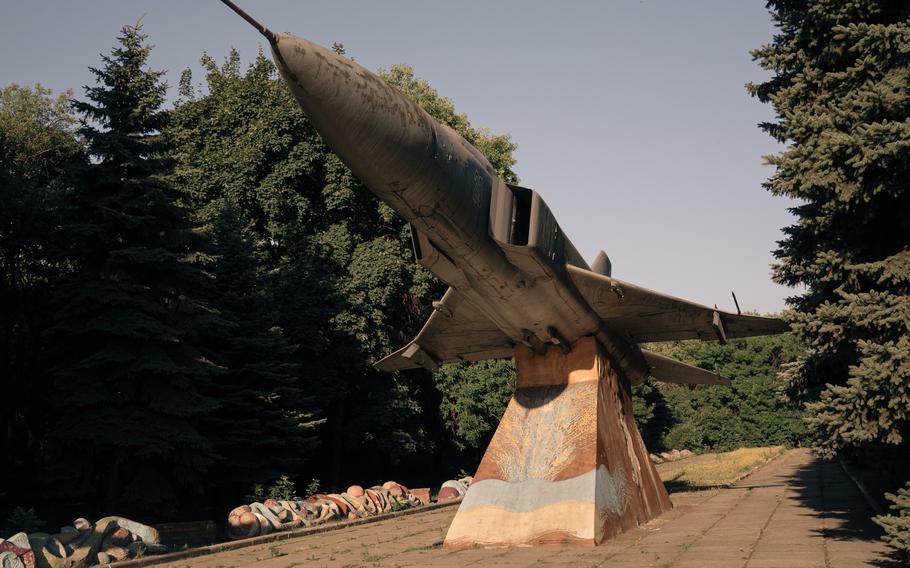
A monument in the Donetsk region featuring a Soviet-era MiG 23. (Alice Martins for The Washington Post)
Pasha, 34, a former coal miner from Pokrovsk who now serves as a drone commander, said the loss of Donbas would be “cataclysmic” and that there was no guarantee that would be the end of it. “Russia is a country of imperialistic ambitions — they will not stop.”
Many fighters insist that negotiating with Russia never works. Having lived through the failure of the Minsk agreements — a barely implemented 2014-15 cease-fire deal that Russian President Vladimir Putin scrapped two days before the 2022 invasion — those in Donbas believe a land-for-peace deal would only give Moscow time to rebuild itself before attempting another invasion.
Natalia Bredova, 38, of Slovyansk knows the cost of the war too well. Her 20-year-old son, Volodymyr, was killed fighting in Avdiivka in March. Her husband is also serving in the army.
“Too many men have died for this. It’s too late to talk about negotiations. They are the light of our nation. We have to keep on fighting,” she said, adding that she would never live under Russian occupation even if she were “offered piles of gold.”
To many Ukrainians from Donbas — a large coal basin that was once a jewel in the industrial crown of the Soviet empire — the looming threat of Russian occupation has been a fact of life for years.
Vitaliy Barabash, the head of Avdiivka’s military administration, has been fighting Russia since 2014. The city was finally captured by Russia in the winter after a decade of fighting.
Now he sits in a dingy backroom office in Pokrovsk, finishing his remaining administrative tasks, including helping residents to claim compensation for lost homes and coordinating hubs for Avdiivka’s refugees in Dnipro. One wall is adorned with the flags of Donbas and Avdiivka, the latter a jagged red flame set against a green background, symbolizing the flame that once burned over Avdiivka’s massive steel factory.
“I’ve been in the military since 2014, so I know what it feels like to lose territory,” he said. “But many people are hurting … and this felt like losing a limb.”
Barabash disappeared for three days after Russia captured Avdiivka, he said. “I needed to be alone. … Even my relatives knew not to reach out to me. I was in a really bad mental state.” These days, he likes to go to the shooting range or drive his motorcycle around Dnipro to cope with the stress.
He does not believe that Zelensky would sign a peace deal that would “abandon” Donbas and said that it would be a “stupid mistake” to reason with Moscow. “Most people are hopeful that we will return to Avdiivka. They are ready to live in tents and rebuild this city.”
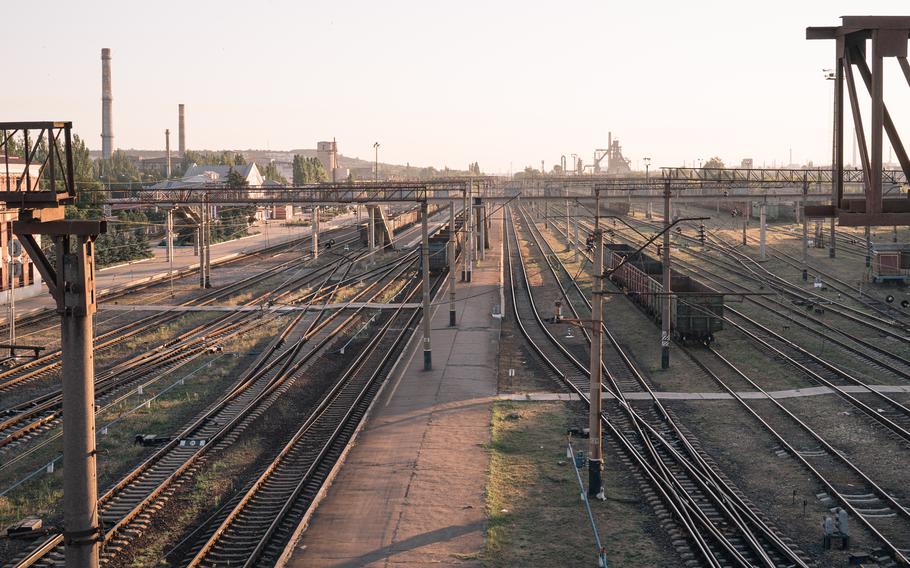
Train tracks on the outskirts of Kramatorsk in the Donetsk region. (Alice Martins for The Washington Post)
Putin has long claimed that one of his justifications for the war in Ukraine was to defend the Russian-speaking people in eastern Ukraine from what he falsely claimed was genocide. Russian soldiers interviewed by The Post in Russia cited this as a key reason for why they believed the war must continue.
While pro-Russian sentiment and nostalgia for the Soviet past have historically been higher in the east than other parts of Ukraine, there are many Russian-speaking Ukrainians in Donbas who want it to remain Ukrainian — especially since the full-scale invasion in 2022.
Since the conflict began in 2014, thousands of lives and homes have been lost in the name of the Kremlin’s claim to be defending Russian speakers. And as Russian troops moved west, the people of Donbas have been forced to abandon family homes full of memories and belongings and watch as their towns and villages were bombed beyond recognition.
Others, after living away for months or years as refugees, missed their homes and the region’s warm summers, endless sunflower fields and distinctive slag heaps punctuating the horizon. They cautiously returned home and learned to live a few miles from the front lines under the relentless threat of missile strikes. Now, many are packing their bags again, ready to go if Russian forces get any closer.
“With full-scale war, the masks were torn off. Everything became definite, unambiguous and concrete,” said Yegor Firsov, 35, a lawmaker who represented Donetsk in Ukraine’s parliament before the invasion and who now serves as a combat medic in Niu-York on the front lines.
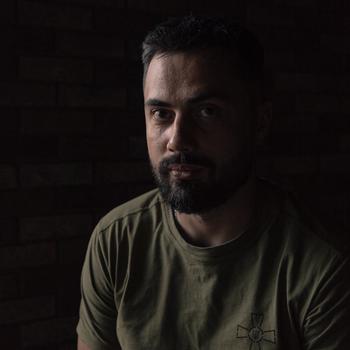
Yehor Firsov, 35, is a combat medic. Before the Russian occupation, he was a member of Ukraine's parliament representing Donetsk. (Alice Martins for The Washington Post)
Firsov remembers Donetsk before the occupation as an affluent, cosmopolitan place: a city that once saw Beyoncé perform at Donbas Arena and hosted the 2012 European Football Championships, when hundreds of thousands of Ukrainians came together waving blue and yellow flags, cheering for Ukraine.
But Donetsk could also be a “dangerous, rough, often wild” place, he said in an interview in Pokrovsk over the summer. People increasingly felt that the region and their grievances were going ignored by Kyiv. As local oligarchs amassed more power, the city’s political plurality faded and Donetsk gradually became more overtly sympathetic toward Moscow.
“Donetsk was big money, big enterprises and big factories left over from the Soviet Union,” Firsov said. “And to keep power in the same hands, the incumbent elite chose a monolithic, single path … and the people of Donbas, at the time, supported this.”
Having led the city’s pro-European protests in 2014, Firsov is well acquainted with the effects of Russian propaganda.
Russian state TV told Donbas residents for a decade that Kyiv was bombing their homes and that then-Ukrainian President Petro Poroshenko was to blame for the conflict. But when the invasion started, Firsov recalls how thousands of men and women joined up to serve in the Brigade of the Territorial Defense of the Donetsk Region. “It was clear that the enemy is Russia, it is the aggressor, it is destroying us and our homes,” he said.
If some Ukrainians once felt that Donbas was a separate part of the country that could be discarded, the full-scale invasion appears to have changed this sentiment for many, even in the west of the country.
After the war began in 2014, some Donbas refugees felt marginalized in the parts of the country to which they fled. People treated them like they were the root of Ukraine’s instability and would only bring trouble. Now that losing one’s home and living as a refugee have become a shared experience for Ukrainians throughout the country, the people in Donbas say there is greater empathy.
Many in Donbas are increasingly adopting Ukrainian, rather than Russian, as their primary language. Soldiers from other parts of the country, who had never previously been to eastern Ukraine, have resettled in the region. Some have married locals and started families.
“It was the war in Donbas in 2014; now it is the war in Ukraine,” Firsov said. “If earlier there was a discussion about whether we need Donbas, whether we can give it up, now there is no such discussion. These are all our territories — and we claim them all.”
Sitting by the waterside of Slovyansk’s salt lake, as the sun lowered in the sky and children splashed and played in the mud around them, Mykola and Artem, two soldiers from Ukraine’s north, were enjoying an hour’s respite in the summer, waiting for orders from their commander.
They had arrived in Donbas a month earlier. It was the first time they had seen this part of the country.
“There are a lot of emotions when you come here, given its history,” Artem said. “But you can’t slice up a country like a piece of pie. This is very much a part of Ukraine: same nature, same trees, same sun.”
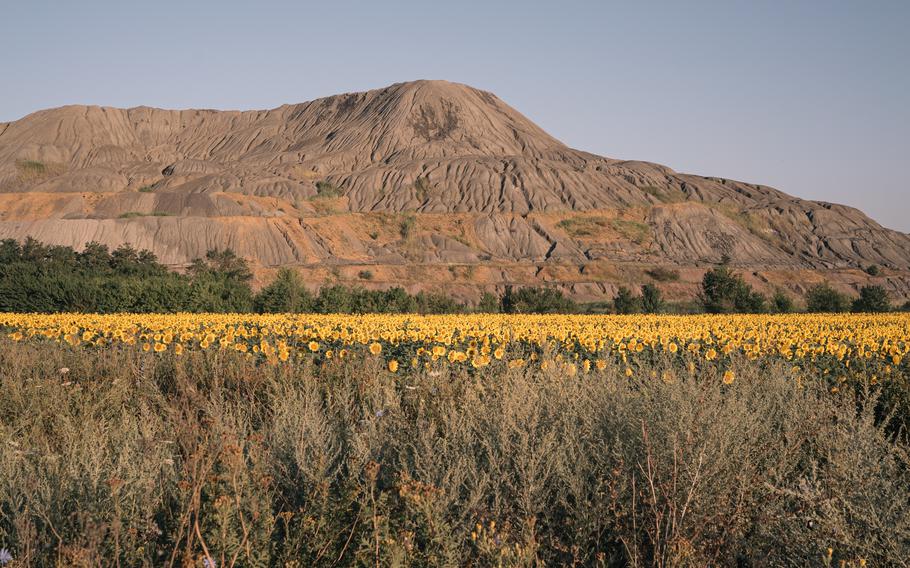
A slag heap in the countryside of the Donetsk region. (Alice Martins for The Washington Post)